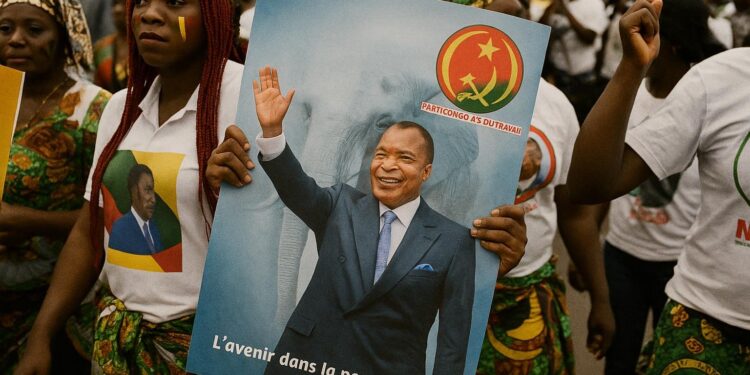Legacy and Legitimacy in Brazzaville’s Polity
Few African incumbents match the political longevity of President Denis Sassou Nguesso, whose cumulative tenure has furnished a dense web of institutional memory and patronage that many analysts regard as both a stabilising anchor and a potential fault line should succession falter. Since his return to power in 1997, the head of state has cultivated what one Central African diplomat recently called “a culture of procedural certainty around elections, even if outcomes rarely surprise” (Africa Confidential, April 2024). The 2026 presidential poll, at first glance, appears poised to replicate this pattern of procedural calm; yet beneath the surface a series of demographic, economic and regional variables introduces a degree of hydrological pressure to the political edifice.
Strategic Implications of the December PCT Congress
The late-December congress of the Parti congolais du travail is widely viewed by insiders as the litmus test of regime cohesion. In previous iterations the congress has functioned as a choreographed re-endorsement of the president, accompanied by minor reshuffles that placate competing factions. This year delegates will meet under tighter fiscal constraints occasioned by fluctuating oil receipts and heightened public expectations after a modest rebound in growth (IMF country report, February 2024). Party barons from Ouesso to Pointe-Noire indicate that the congress agenda will revolve around ‘modernisation of governance’ and ‘youth inclusion’, phrases that align the PCT with continental trends while allowing the leadership to consolidate control. Diplomatic cables seen by this journal suggest that a carefully worded resolution reaffirming Sassou Nguesso’s candidacy is already in circulation, yet the tone is expected to emphasise continuity, not triumphalism, in order to reassure international creditors.
Opposition Fragmentation and Leadership Vacuum
If the ruling party is managing expectations, the opposition is managing mere survival. The Coalition de l’Opposition pour la Nouvelle République, formed in 2023 with fanfare, has since been depleted by personal rivalries and judicial headwinds. Veteran figure Guy-Brice Parfait Kolélas’s 2021 passing left a charisma deficit that no single contender has filled. Attempts by former oil executive Andréa Ngombet to galvanise a technocratic platform have struggled to gain traction beyond urban youth circles (Radio France Internationale, July 2024). Meanwhile, legal challenges continue to inhibit the political activities of Jean-Marie Michel Mokoko, whose imprisonment remains a rallying point yet deprives the opposition of an on-the-ground organiser. Western embassies weigh discreet funding for voter-education programmes but concede privately that, absent a unifying standard-bearer, any challenge to the PCT will be piecemeal.
Security and Socio-Economic Variables Shaping 2026
Brazzaville enjoys a relative calm compared with the turbulent years of the late 1990s, but security planners still monitor the Pool region, where sporadic militia activity persists. The government’s disarmament initiative of 2022 reduced large-scale confrontations, yet United Nations field notes highlight local grievances over reintegration funding. On the socio-economic front, hydrocarbons remain the lifeblood of the treasury, accounting for nearly 60 percent of revenues. The Ministry of Finance projects 3.5 percent growth for 2025, contingent on stable Brent prices, while critics caution that per-capita gains could be erased by inflationary currents linked to import dependency. Although these headwinds do not automatically translate into opposition votes, they may encourage abstention in urban belts, thereby diluting the symbolism of a sweeping mandate.
Regional Optics and International Stakeholders
Congo-Brazzaville’s diplomatic posture rests on two pillars: its perceived role as a mediator in regional crises and its strategic partnership with Beijing. The president’s shuttle diplomacy between Bangui and N’Djamena earlier this year earned plaudits from the African Union, underscoring Brazzaville’s commitment to multilateral stability. Simultaneously, a new tranche of Chinese concessional lending for the Sounda hydroelectric project, announced in May 2024, reinforces bilateral ties without imposing excessive debt distress, according to the Ministry of Economy. Western partners, mindful of energy security and counter-terrorism corridors across the Sahel, signal willingness to accompany the electoral calendar provided transparency benchmarks are met. In practice this amounts to logistical support for voter roll audits and limited observer missions rather than forceful conditionality.
Calibrated Prospects as Electoral Clock Ticks
The confluence of an orderly PCT congress, a diffuse opposition and measured international engagement suggests that the 2026 election is unlikely to diverge dramatically from established precedent. Yet seasoned diplomats caution against complacency. A sharper-than-expected economic downturn, adverse security incident in Pool or health shock similar to the 2023 chikungunya flare-up could unsettle the choreography. Conversely, a well-timed infrastructure ribbon-cutting before the campaign—perhaps the long-delayed Brazzaville deep-water port—could buttress the narrative of steady stewardship. For now, President Sassou Nguesso’s strategy appears to hinge on projecting predictability while quietly tightening the safety nets that cushion the system from exogenous jolts. In the realm of Congolese politics, maintaining equilibrium is less a static state than a perpetual tightrope act; the balancing poles are still firmly in the incumbent’s hands.











































